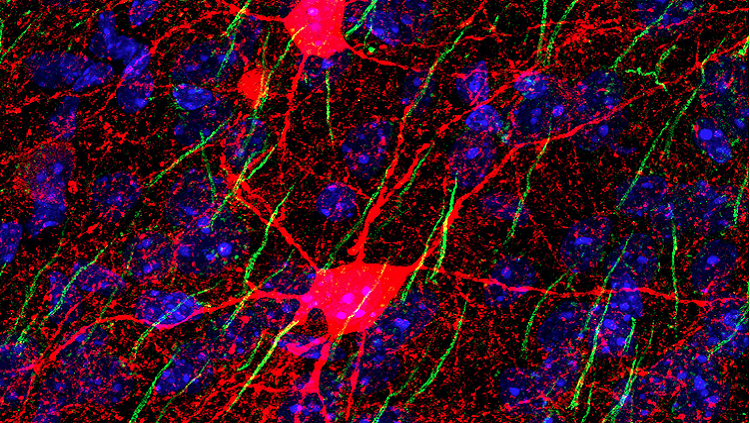Painful Consequences
- Published21 Nov 2018
- Reviewed21 Nov 2018
- Author Michael W. Richardson
- Source BrainFacts/SfN

Chronic pain affects more than 10 percent of the population, and it can sometimes be debilitating. This condition can also cause cognitive effects that can further harm the lives of the people affected by chronic pain, which most pain medications can’t reverse. Researchers have found that cells in the medial pre-frontal cortex (such as interneurons, pictured above in red) have shorter axon initial segments (highlighted in green) in mice in pain. This region is associated with working memory and decision making, and those functions are among those that chronic pain inhibits — even after being treated by pain medication — by shrinking the cells in that region. Surprisingly, while traditional pain medications did nothing to alleviate these deficits, metformin, a type-II diabetes medication, completely reversed the impairments. The drug helped restore the lost length of the axon initial segments, restoring them to proper function. It may be possible this drug could be repurposed for use in pain management, but more research is needed to say so definitively.
CONTENT PROVIDED BY
BrainFacts/SfN
References
Shiers, S., Pradhan, G., Mwirigi, J., Mejia, G., Ahmad, A., Kroener, S., & Price, T. (2018). Neuropathic Pain Creates an Enduring Prefrontal Cortex Dysfunction Corrected by the Type II Diabetic Drug Metformin But Not by Gabapentin. The Journal of Neuroscience,38(33), 7337-7350. doi:10.1523/jneurosci.0713-18.2018
Strassels, S. A. (2008). Cognitive effects of opioids. Current Pain and Headache Reports,12(1), 32-36. doi:10.1007/s11916-008-0007-4
Also In Injury
Trending
Popular articles on BrainFacts.org


















